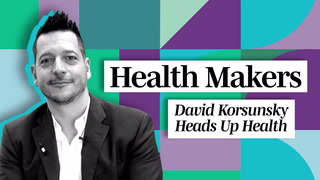Health Makers: How the App Heads Up Health Helps People Measure Wellness
David Korsunsky’s mission to take charge of his own health led to a tool for others.

Health Makers: How the App Heads Up Health Helps People Measure Wellness

David Korsunsky was never obese. But it annoyed him that he was never as lean as his friends.
“I started lifting at a young age, but I had no idea that I wasn’t losing weight because of the food I was eating,” says Korsunsky, 43, who grew up in Winnipeg, Canada. “I was working out a lot but could never really get the results I wanted. I was eating all high carbohydrate food: hamburgers, fries, pasta. I didn’t understand how to read a label and see how much sugar was in something. or that it was made with completely refined white flour that sends your blood sugar higher than refined sugar does.”
At the time, he was living in Silicon Valley and working at a large technology firm. He had moved up the management ranks quickly. “Before I knew it, I had 20 guys working for me, all older and more experienced,” he says.
The responsibility took its toll. He was exhausted, stressed, and out of shape. “The doctor said I was fine, but I knew I wasn’t,” he says.
Korsunsky decided to do a deep dive into his medical history, which required hard data. But this wasn’t as easy as it sounded because he had to reach out to doctors he’d seen over the years in all of the places he’d lived. This included Canada, Boston, and the San Francisco Bay Area. What’s more, each office only had snippets of his health information.
But he did it. Then he measured other things, like the quality of his sleep. How much did he sleep each night? How much did he toss and turn? “I discovered that I was only sleeping five and a half hours a night, despite working out at a gym and having a stressful job. That wasn’t enough."
He worked with strength and conditioning experts and those who specialized in meditation and stress.
Then he started checking his blood sugar in the morning and tried to see how different foods affected his levels. “I learned how to make good food choices,” he says. “I went on a keto diet and started measuring ketones, which tells you if your body is in ketosis.”
He input all his data into an app, with information dating back to 2005, when he was a graduate student at Northeastern University in Boston. The records come from five different doctors’ offices.
Realizing that other people might also benefit from similar information, he launched Heads Up Health — a digital health metrics app which does for people what Korsunsky did for himself — in 2017.
“The app pulls together all your records,” he says. “Instead of having to call 10 doctors and fill out paperwork and wait for records, we synchronize it all electronically. Within five minutes we can stitch together all your current and past doctors. It’s like Quickbooks or Mint. You sign in, search for your doctor, we ask for your patient credentials and we synchronize the data. Instead of calling four doctors, it’s all on one chart. We can go as far back as the data exists in that doctor’s portal.”
So far, more than 25,000 people are using the system, most of whom are between 45 and 60 years old. Subscriptions begin at $9 per month, $79 per year, or $199 for a lifetime membership.
Not only does it help pull together people’s medical history, it can also help people track their lifestyles, to help them make better choices for their futures. So, for example, the app connects to My Fitness Pal, so it can track how much exercise a user gets. It also assembles food and sleep data.
“People can measure their lifestyle,” Korsunsky says. “Did I get enough sleep? Eat too many calories? Then they get to see how that affects their lifestyle. You can have all your cholesterol numbers together in one place, so you see how the number change as you age. Even if you get a new doctor, you’ll know that you have the full story. Then you can make whatever dietary changes are necessary.
“You don’t need to be a medical professional or tech expert,” he says. “We’re really giving people the tools to figure their health out for themselves.”
